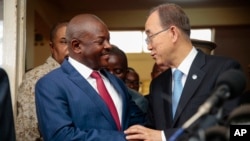The African Union says it will send 200 military advisers and human rights observers to Burundi, 10 months into the country’s violent political crisis over President Pierre Nkrunziza’s third term. International diplomatic efforts appear to be making little headway.
Five African heads of state were in Burundi last week to push for an end to the crisis. The outcome has been underwhelming for some.
Pancase Cimpanye is deputy spokesman for the political opposition now in exile, CNARED.
“We are a bit disappointed with AU delegation because they did not emphasize the importance of the peace accord agreement of Arusha. They did not emphasize the need to come around a table of talks outside the country, talks between Nkurunziza and CNARED, I mean the opposition, and they did not talk about the AU force," said Cimpanye.
Rights agencies say at least 400 people have been killed during the crisis. Another 200,000 have fled the country.
In December, the African Union proposed sending 5,000 troops to Burundi, but the bloc backed off when the government rejected the initiative.
Zuma said Saturday the African Union will now send 100 human rights monitors and 100 military advisers to Burundi.
Those monitors may find their work difficult, says Amnesty International researcher Rachel Nicholson.
“The situation in Burundi is very tense at the moment and it is very difficult for human rights observers to carry out their work. We have seen situations deteriorate rapidly over the last 10 months, and current trends are frequent arrests of young people particularly from opposition neighborhood, the security situation has also deteriorated," said Nicholson.
Zuma also reiterated the African Union’s calls for inclusive dialogue. The Burundi government has insisted it is ready.
But research associate at the Institute for Security Studies in Nairobi, Yolande Bouka, says there is still disagreement about who will participate, even in the wake of these high-level A.U. and U.N. visits.
“When Ban Ki-moon went to visit Bujumbura a few days ago, the government agreed to inclusive dialogue, but they turned around and said the armed opposition, CNARED and people who are believed to involved in the coup will not be invited or involved in the mediation so this a bit contradictory when we know the international community is expecting mediation to be all among the stakeholders," said Bouka.
The Burundi opposition says the African Union’s choice of mediator could also be holding things up. Ugandan President Yoweri Museveni was preoccupied with his own bid for a fifth term in office February 18. It is a distraction that may continue as tensions remain high in Kampala over the arrest of opposition challengers and alleged vote rigging.











